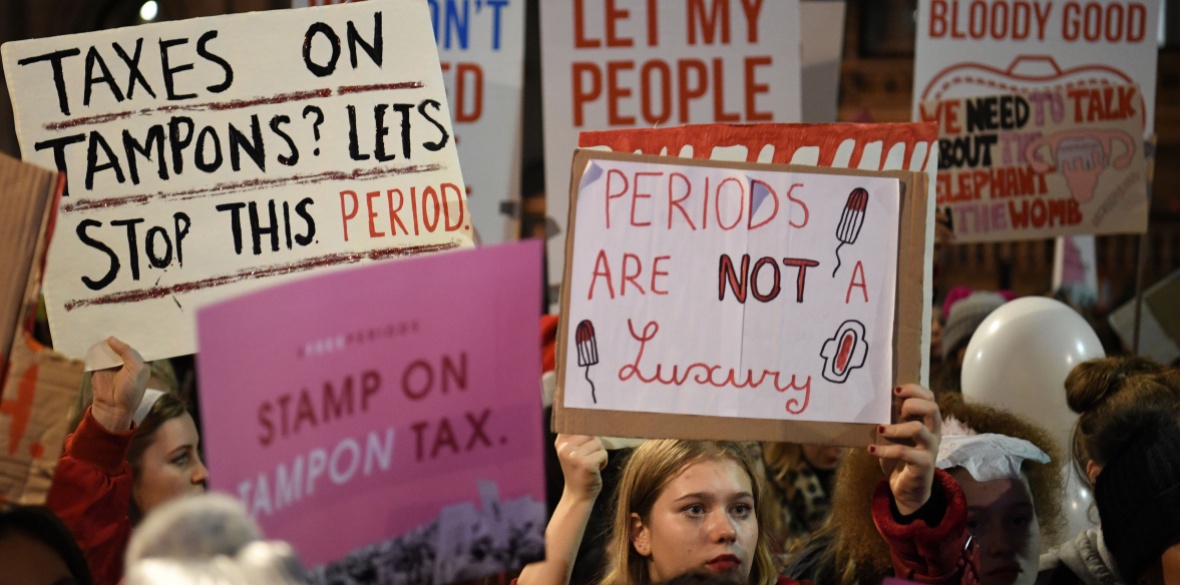This is the last article you can read this month
You can read more article this month
You can read more articles this month
Sorry your limit is up for this month
Reset on:
Please help support the Morning Star by subscribing here
ELEVEN years ago, Thabitha Khumalo of the Zimbabwe Congress of Trade Unions addressed Unison conference and STUC Congress asking for support for Dignity Period, a charity set up by Action for Southern Africa to provide sanitary wear for women in Zimbabwe.
Because of the economic situation many women and girls just couldn’t afford sanitary products and resorted to using leaves, bark or newspapers, which caused infection and sometimes death.
I remember back then being appalled at the indignity and the serious health implications for these women and girls.
What I didn’t realise at that time was that these same challenges extensively affected women and girls in Britain. And still do, made worse by Tory-led austerity.
The current debate on period poverty, led in Scotland by Labour MSP Monica Lennon and the Homeless Period campaign, has shone a light on the problem, and not before time.
I can’t believe that as women we have put up with period poverty for so long. That even as I was shocked by Khumalo’s accounts of women’s experiences in Zimbabwe, I didn’t see that there would also be period poverty here.
Just as it had never occurred to me to question why women continue to pay for sanitary products, allowing business to profit from our need; or to consider that there must be many women and girls in our own country, living in poverty or homeless, who just can’t afford to buy sanitary wear.
Yet until the recent campaigns on period poverty that’s exactly how it was for me. And I think it’s because of how the whole “period” issue is dealt with for girls.
Certainly when I was growing up, you always felt there was something a bit shameful about having your period.
I remember as a young child, going into the chemist with a note and some money to get a “message for my mum” and coming out with an anonymous parcel wrapped up in a paper bag.
I never knew what I was buying for a long time, until I had my own period and realised it was how we bought sanitary towels.
Even as I got older and had to buy my own, I would skulk around the chemist waiting for the man to go and a woman to be serving before taking my towels or tampax surreptitiously to the counter.
When supermarkets began to stock them, and even when I was much older, it was still a bit of a red face moment as the boxes went through the check-out. What was that about?
Somewhere along the road our male-dominated society has decided that periods, despite the fact that they are a natural aspect of every girl and woman’s lives, and a sign of fertility and procreation, are somehow “not nice.”
Referring to them as “the curse” set the tone for how they were viewed — in some way shameful.
Why, as women, we went along with it for so long is a mystery to me and I relish the current discussion — the way women are opening up about menstruation, are talking about the challenges they face and are challenging the way that periods can be used to oppress them.
Period poverty significantly affects the life chances of many girls and women. It’s an equalities issue but it is also a class issue, and with the growing numbers of people living in poverty it has got worse.
A recent poll in Scotland has shown that one in five women have experienced period poverty when they have been unable to afford basic sanitary products on a monthly basis.
They have had to choose food over sanitary wear. This has significant implications for their health and hygiene, with respondents to the survey using alternatives such as toilet roll, socks, old clothes and newspapers.
Some 22 per cent said that they were unable to change their sanitary wear as often as they would like, leaving them vulnerable to health problems such as urinary tract infections and thrush.
Period poverty also has huge implications for girls’ education. As the Educational Institute of Scotland has found, girls are missing out on school because they cannot access sanitary wear.
On a monthly basis the existing challenges of having your period is worsened for many because they do not have access to suitable sanitary products.
But women are speaking out. And women are taking action. Trade unions have taken it up as an issue. Grassroots supporters in Scotland and across Britain have already begun to provide free sanitary wear in offices and public spaces, including football grounds.
Monica Lennon’s Bill is now going through the Scottish Parliament to secure the provision throughout Scotland of free period products, including in schools and educational establishments.
For the first time, all women in Scotland will be able to access sanitary wear for free.
England and Wales have also woken up to this need and while their response does not at present go as far, at least money has been made available to provide free sanitary wear in secondary schools in England and Welsh First Minister Mark Drakeford has promised money to end period poverty in schools in Wales.
It’s great to see this issue getting prominence at last. However, as Lennon has pointed out, this is as much about changing cultures as providing funds, important though that is.
Menstruation is a normal part of life for over 50 per cent of our population and until all women and men feel able to talk openly about periods, without any stigma or shame, the risk will remain that menstruation and period poverty will continue to oppress women and girls.
Kate Ramsden is a member of Unison NEC.











